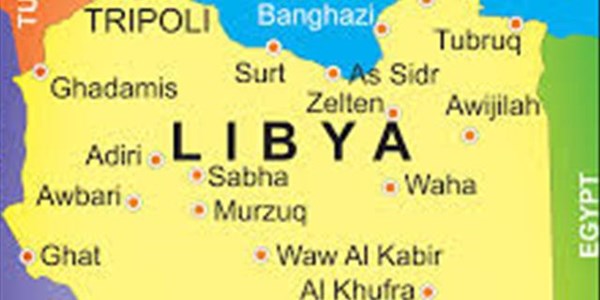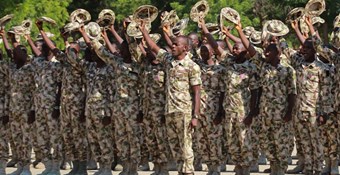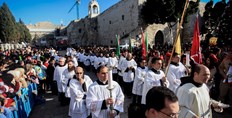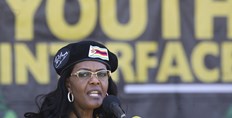Africa News
Libya peace talks: More of the same?─── 11:30 Wed, 30 May 2018

A "historic" moment. That's how French President Emmanuel Macron described a summit on Tuesday between Libya's rival factions aimed at bringing peace and stability after nearly seven years of turmoil.
Meeting in Paris at Macron's behest, leaders from the rival Tripoli and Tobruk-based parliaments agreed to hold elections later this year.
But as cameras flashed around Elysee Palace, capturing Macron's handshakes with Libyan Prime Minister Fayez al-Sarraj and eastern-based renegade General Khalifa Haftar , others were less optimistic.
"While the optics of this meeting are very encouraging, there is no breakthrough here," said Riccardo Fabiani, geopolitical analyst at UK-based Energy Aspects.
"There is once again just a promise to solve the problems through dialogue and a timeframe that looks quite unrealistic," Fabiani added, noting that the two rivals attending the Paris summit only gave their vocal support to the political roadmap without signing any agreement.
Ahead of the meeting in the French capital, the International Crisis Group had also cautioned against rushing into an agreement.
"Reaching an accord could generate a brief moment of enthusiasm but risk being followed by recriminations when signatories - facing opposition by some of their allies back home - renege on their pledges," the group said on Monday.
The Paris meeting was attended by representatives from 20 countries, as well as from the United Nations, but was boycotted by some of western Libya's most powerful armed groups.
It ended with a fixed date for setting the constitutional basis and commitments to pass the necessary electoral laws by September 16 in order to then hold both parliamentary and presidential elections on December 10.
Armed factions unrepresented
Libya splintered into rival political and armed groupings after the uprising that toppled Muammar Gaddafi in 2011.
It remains deeply divided between factions based in the east and west that back rival governments and parliaments.
Al-Sarraj is the head of the UN-backed, Tripoli-based Government of National Accord (GNA).
Haftar, head of the self-styled Libyan National Army (LNA), is the dominant figure for factions in eastern Libya that have rejected the GNA's authority, contributing to its failure to expand its authority in the capital and beyond
The oil-rich country's troubles have been amplified by outside actors vying to extend their influence, with each side now counting on external powers to prop up their military capabilities.
This is not the first time figures from Libya's main rival camps have met - Macron hosted another meeting last July, while similar summits in Egypt, the UAE and elsewhere failed to produce any meaningful progress.
In September 2017, Ghassan Salame, the UN's Libya envoy, criticised the high number of talks taking place with regard to Libya.
"There are six or seven different operations in front of Libyans' eyes. Too many cooks spoil the broth," he said at the time.
Ahead of the Paris meeting, a western Libya-based group of 13 military councils and brigades, loosely aligned with al-Sarraj's government, issued a statement denouncing the Paris summit, saying it did not represent their interests.
They called for "real dialogue centred on the aspirations of Libyan society", as they announced western Libya's readiness to host such a meeting once the war is brought to an end.
Anas El Gomati, a Libyan political analyst and founder of the Tripoli-based Sadeq Institute, raised questions about the impact of the Paris meeting in the absence of many key players who constitute a significant pillar of Libya's power mosaic.
"How is it some of the most powerful groups in Libya are not invested in the Paris meeting and what does it say about a deal reached in less than 24 hours?" said El Gomati.
In neighbouring Tunisia - where conditions were identified as more ripe for a less troubled transition in 2013 - the deliberation process took an entire year and necessitated the intervention of the country's powerful labour unions.
El Gomati described the French-led initiative as "devoid of any legitimacy".
"It is not aimed at getting Libya out of crisis but rather conferring legitimacy upon a military regime and legitimising its use of violence," he said.
Fabiani agreed, saying the absence of powerful armed groups was a major setback in any attempt to forge a transition to democracy.
"It is one thing to get the main political leaders to agree to a roadmap and quite another to get the people who control the territory [militias, municipalities, tribal and ethnic groups] to support it," he said.
"Without the latter, the former is just an empty promise to please the international community."
While western-based rebels have consistently demanded that the military fall under the authorities of a civilian administration, recent developments and the bloc of 13's decision to opt out of the talks raise doubts over al-Sarraj's control of armed groups.
Over the weekend, Tripoli-based groups displaced Libya's Presidential Guard - which answers directly to al-Serraj - from strategic outposts, including the country's shuttered international airport.
Meanwhile, Haftar's recent hospitalisation and the wave of rumours it ignited - especially over his health - has led observers to question the LNA's cohesion as a force to be reckoned with since, they say, it mostly hinges on the commander's charisma and would be hard to replicate in case of a succession.
Stakes too high
Analysts said another key issue in the event of an election is whether the winner will accept an opposition that will work to replace them in a few a years, as per democratic norms and procedures, and vice versa.
"If either side loses, there is no incentive here to force them to accept the result - and for the winning camp to avoid going after the losers," Fabiani said.
He says the same problems that have undermined peace attempts in the past are still there and this agreement is only an initial step forward, which in the end might not prove sufficient to resolving the crisis.
For some like Jalel Harchaoui, an academic with a focus on Libya, the talks in Paris could have addressed more pressing issues, like the state of the economy and human rights abuses.
"There's a very serious monetary crisis in Libya and France went into the summit with the intention of bringing this up," he said.
"They talked about the reunification of the central banks but didn't go into the details of it all, which suggests that France perhaps created too much work for itself."
For El Gomati, the summit simply duplicated efforts already under way by the UN to resolve the crisis.
"There has been four years of attempted dialogue led by the international community and normally these things take a lot of time," he said.
"This initiative is supposed to represent strong international will behind a peaceful transition of power, yet there has been no attempt to enforce an arms embargo that is essential to ripening Libya's political factions towards a peaceful settlement," added El Gomati.
"How peaceful can Libya's elections be, given individuals and countries represented on the table in Paris continue to use or pour weapons into the country."













